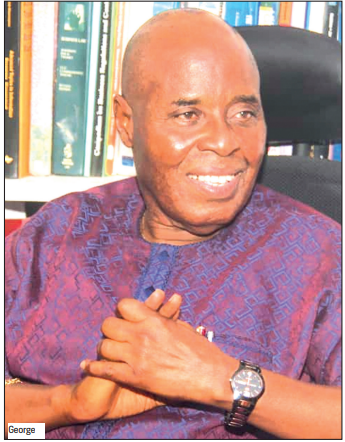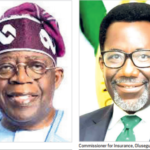Prof. Olusoji George, a retired Professor in the Faculty of Management Sciences, University of Lagos (UNILAG) and a former Manager in K. Chellarams and Sona Breweries, in this interview with TAIWO HASSAN, speaks on various challenges facing Nigeria’s business environment and the efforts being made by the Federal Government to restore hope
When you were working in Sona Breweries, the profile of Nigeria’s manufacturing industry was relatively high then. So what would you say must have accounted for the reduced production level in the country?
In respect of the brewing industry in particular, the biggest operators then in the country were Nigerian Breweries Plc and Guinness Nigeria Plc. In all, we had over 30 breweries in the country. At that time, smuggling was so easy. So, with high production level and presence of imported brands in the market, there was a glut in the beer industry.
The high local production level was accentuated by new plants being established, with NBL setting up a new plant then in Ibadan and Guinness establishing another brewery in Benin. New breweries were also being established across the country.
So, competition became intense and those companies that couldn’t cope were bought over. Others went under. Sona Brewery, for example, was bought over by NBL and its premier Gold brand was changed to Goldberg. Before the turn of events, disposable income in the country was relatively high, with parties being thrown around.
So, we were all doing well. But by the time the price of crude oil fell, including other challenges, there were no more the profile of celebrations and the resultant parties everywhere. So, the relatively high production level, record level of smuggling of various brands of beer in the country and drop in oil price, the situation became highly challenging for breweries leading to the afore-stated drop in corporate operational profiles.
When some of these brewing companies went down, other sub-sectors were also going down like textiles and others. So what could have been responsible for the de-industrialisation trend in the country?
Just like the scenario in the brewery industry, unbridled spate of smuggling, glut in the market and drop in the price of crude oil challenged the operational profiles of virtually all the other sub-sectors of Nigeria’s manufacturing industry. Remember electronics companies like Adebowale, Phillips, Sanyo, among others, where are they now? Same with Beta Foam and the textile firms.
Our people brought everything down by importing from France, China, Taiwan, Japan, India and other parts of the world. Also greatly affected were the vehicle assembly plants; the tyre producing companies like Dunlop and Micheline; the spare parts making outfits; among others. Virtually all of them went down as they couldn’t cope with the substandard products being imported into the country.
Look at the paper industry too, companies like Onward Paper Mill, Pyramid Paper Company all went down. They couldn’t compete. Importers mostly smugglers brought in substandard fake products to push out locally-made brands like fans that wouldn’t last after three months, but would be half price of our own KDK and other locally produced brands.
But how helpful were the government’s policy measures to local manufacturers during this period you are talking about? That was another big challenge to our local production. The spate of military coups brought about unstable government policies. Policy somersaults became the order of the day.
The monetary and fiscal policies were following the ways and means trajectory. Several opinions were raised especially in the media against the development but our military rulers could not be persuaded otherwise. Long term development plans earlier scripted were jettisoned, leading to short lived plans with resultant short span sustenance. We ate our dinner as breakfast resulting in the proverbial bad dreams.
So the bad dream started that time you are eating it. I have said this before that Nigeria is now talking about CNG vehicle policy. Why? In America, they have picked a date where they would not use all these fossil fuels any more. Are we planning against such development?
Presently, the issue of hardship is being chorused across the country. How can the present administration bring about the needed succour to the people?
I agree that things are presently tough in the country but we have to look at situational factors that have brought us to this level and assess where we would have been. It is where we would have been that makes sense than where we are now. The present administration has taken the right decisions to put right the wrongs of the past.
This has been made explicit in the bold steps already taken. These measures like the withdrawal of fuel subsidy and the reforms in the monetary policy may bring about some temporary pains but they are the leeway to sustainable economic development and growth that will bring the required succour to the people.
Abroad, fuel prices are deregulated, promoting competitiveness in the market. Petrol stations sell at different prices. The resultant competition offers quality service to customers. Now, that’s coming up in Nigeria. What do you expect from a CBN governor that wants to become President? What type of monetary policy was he running for the country while in CBN? So, what we
The present administration has taken the right decisions to put right the wrongs of the past. This has been made explicit in the bold steps already taken
are doing now ought to have been done more than 10 years ago. When former President Goodluck Jonathan was getting $120 per bpd for crude oil, what did we do with such windfall? How much are we getting now? We should be commending President Bola Tinubu for the measures he is taking now.
Do you remember that they have sold these Nigeria’s refineries to Dangote and my brother Femi Otedola? Obasanjo sold them. But when Late Musa Yar’Adua came in, he reversed the situation. That was what made Dangote to start the largest refinery we are having here today. So, the point I am making is that we are just seeing what is called thriving economy.
Look at the indices. Stanbic IBTC sent something to me that we can now use our ATM cards for dollar. What does that signify? Do you know that we were borrowing money that has now become a problem to us? They have sold our fuel upfront to pay for loans. And what did we do with the loans? Consumption. So Dangote refinery is a game changer. Actually, I moved from Yaba to Lekki because of Dangote refinery. Because I want to be where the action is. So, I am preparing for my retirement.
How would you assess the economic performance in the outgone quarters of the year?
Let us say the truth, we are not there yet. I can’t say that we are there. But don’t forget, Mr. President has just barely spent only two years now. So, it was two years ago he started and I am sure, he’s going to perform.
We need to give him another two years to complete his first term for us to know the true position of Nigeria’s economy. But speaking on the first quarter of 2025 GDP growth, with the recent release of Nigeria’s rebased GDP figures and the Q1 2025 economic growth data, I can say that we are on the right track to meaningful growth.
With a real growth rate of 3.13 per cent and nominal GDP now recorded at N372.82 trillion, this development offers a more comprehensive and contemporary reflection of the Nigerian economy, capturing vibrant informal activities, tech-driven enterprises, and service-oriented sectors that were previously under the radar.
Again, let me emphasise that the rebasing from the 2010 to 2019 base year brings Nigeria closer to global statistical standards and reveals a more diversified economy, where real estate, trade, telecomunications and crop production now dominate, while oil’s share continues to decline.
However, behind the optimistic figures lies our reality. Economic conditions have put a large portion of the population into poverty, inflationary pressures have continued to weaken our purchasing power and rising cost of living has continued to rise. Inflation remains unrelenting, especially in the food segment, an alarming indicator in a country where most household expenditures are food-related.
The naira’s depreciation, now hovering above N1,530/$, has severely diminished real incomes, while energy costs, from petrol and diesel to cooking gas, remain painfully high. These pressures affect both households and businesses, worsening inequality and making daily survival a struggle for many.
Therefore, this is a call to action. The government must move from statistical celebration to strategic economic transformation. I know that stabilising the naira must be a top priority. This requires restoring FX confidence, boosting nonoil exports, and supporting domestic production.
Also, food security must be urgently addressed through input subsidies, storage systems and improved logistics to combat inflation and hunger. The government must intensify efforts to empower MSMEs and the informal sector through access to finance, aggressive operationalization of the 2025 Nigerian Tax Reform Act, and deployment of digital tools.
We need targeted job creation programmes, especially in agriculture, construction, and technology, backed by aggressive skills development. We need to restore citizens’ confidence through transparency, social protection and visible policy implementation.
International development agencies like the World Bank and the IMF have projected Nigeria’s GDP growth at 3.6 per cent and 4.1 cent in 2025 to be driven by an expected increase in oil production, and the services sectors like financial services, telecommunications and ICT. Improvement in local refining capacity is expected to ease energy costs, save foreign exchange spending and attract more investments into the oil and gas sector.
However, I will urge the government to pay continuous attention to inflation and the foreign exchange market and sustain efforts in fiscal and monetary policy interventions.
What is the future of management education considering high unemployment rate and the emergence of Artificial Intelligence (AI)?
Now, I don’t know whether you are aware that I am a lecturer in the Lagos Business School (LBS) in the department of OB (Organisational Behaviour). I lecture there. I am happy you mentioned this. We got it wrong before. Unilag Business School, when did they started it? Operational take-off started just five years ago. But the plan has been conceived seven or eight years ago.
University of Lagos did not have a Business School until late. When you go abroad those days and you are from LBS, they think you are from Unilag. Now, we forgot about technical education. Now, President Tinubu has promulgated that going to technical school in Nigeria is free.
And they would even give you financial aid. We have to refocus ourselves. We have not been getting it right in our management education. It is now we are getting it right. Now, tell me, has any past President talked about giving out education loan? Now, I understand that you can’t convince Nigerians to be patient with Tinubu’s administration, because they want to be seeing actions.
I have been to about two or three conferences where this issue of AI was discussed. Would there be problems when AI comes? No. It will just be that you now have to change your skills. You retool your skills, after all, the AI is a human creation. The AI is for human beings. They should be careful with the news they are spreading on AI. Fortunately, at LBS, we have started doing AI.
I said it during our last Unilag Senate meeting that we were no where in Unilag on AI learning. In Unilag MBA, they are still doing quantitative techniques. Which business uses that now? Unilag is a premier school and now, you can see they are just starting Unilag Business School of late.
This Faculty of Management Sciences is the first in Nigeria. It is the first Business Administration department in the country. So, they went conservative. It is just in the last five years that they are getting to know. So, what I am saying in essence is that things were down. When I was going to school at University of Ibadan (UI), from 1976-1979, they gave us bursary awards They gave us Federal Government Allowance.
Our food before ‘Ali Must Go’ I think we were spending N2.00 plus on three square meals. At our canteen, they used to divide full Chicken into four during our meals at UI. We had a good time. But things have changed. The hostels are now overcrowded. What do you want to bring out of such students? The point is that we have derailed completely. And who is to be blamed? The military.
So, the military era damaged Nigeria’s structure. During Gowon ‘s regime, he said we had money but we didn’t know how to spend it..We were paying the salary of a Carribbean country. That is why, when President Tinubu went to Saint Lucia, people were afraid. Was he going to pay their salaries too? How can a country be paying the salary of another country in Carribbean Island? But he went there.
So, what the military did to Nigeria’s structure, both economic and political, will take years to recover. I think it is going to be many more years. They did the damage. You can’t compare what we had then under the military era to what we have now under the civilian administration. And you know, military is a command structure.
But when it comes to democracy, it’s a different ball game. So, the damage has been done. I was even discussing with some friends that what was the population of Nigeria during the military regime. Then what is the population of Nigeria now?
How do you see the “Nigeria First” policy just signed into law by President Bola Tinubu?
I welcome the introduction of the “Nigeria First” policy as a timely, strategic response to the US tariff hikes and global trade tensions. So, the “Nigeria First” policy, recently launched, must be enforced in favour of MSMEs through inclusive procurement frameworks that link them with anchor buyers in agribusiness, manufacturing, and digital services. It will promote industrialisation in the country.
Now, I don’t know whether you know this. There is an agency that can give you car loan. But you must buy the one that is assembled in Nigeria. That’s exactly the path to tread for industrial growth. Look at Innosson Motors, it has started producing CNG vehicles now. We need to be patronising such vehicles, especially at official level. I don’t see any good reason why our National Assembly people should be riding Prado SUV Bulletproof.
Innosson Motors can do bulletproof vehicles. Likewise Nord Company. And do you know that anytime you buy foreign products, you are increasing their own GDP, and your own GDP is going down. How can government give you car loan and you go and use it to buy Toyota Camry Hybrid. So you are now financing Toyota Japan.
In fact, I agree with lots of Nigerians that things are tough. But we have to endure the pains to achieve a more sustainable economic growth and development, that will bring succour to the people.
What is your position on the regulatory challenges in the country?
You can see that regulatory uncertainty dampens investor sentiment, especially around the Data Protection Bill, fintech licensing, and data center infrastructure classification. There has also been a delay in granting digital banking licenses to several credible fintech operators, leading to capital flight and slowed innovation.
In fact, the Federal Government’s May 2025 suspension of the Cybersecurity Levy, previously pegged at 0.5 per cent of all electronic transactions, was a welcome intervention following intense pushback from industry stakeholders and consumer protection groups.
So, a holistic review of the regulatory cost burden on digital enterprises must now follow this suspension. Again, I acknowledge the government’s renewed commitment to fast-tracking the National Artificial Intelligence Strategy, announced in April, and urge expedited stakeholder engagement on the Blockchain Adoption Roadmap, expected by Q4 2025. These frameworks are critical to positioning Nigeria as a regional leader in emerging technologies and digital sovereignty.





